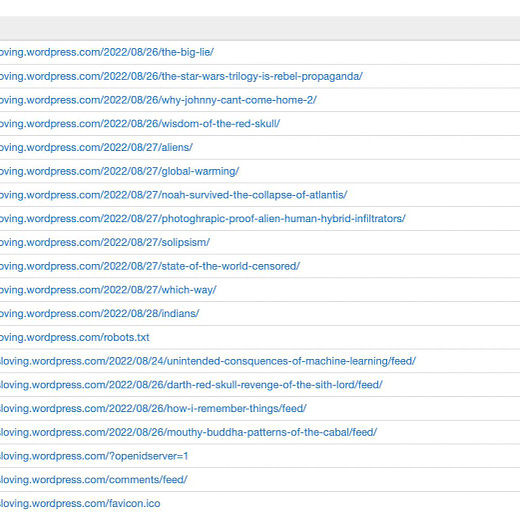When violence is downstream from culture
Paul Pelosi's attacker was consumed by a culture that—while it does have some purportedly left-wing adherents—is vastly, overwhelming dominated by right-wing figures and talking points.
The flurry of speculation, misinformation and absolute absurdity that were unleashed after the attack on Paul Pelosi—a violent attack by an unknown intruder weilding a hammer which fractured the 82-year-old victim's skull—was perhaps unprecedented but only in its scale. Every time we start to believe we’ve seen the absolute peak of insanity on social media, reality slaps back and reminds us there is always another summit ahead. It can always find a way to be crazier. The false storylines that emerged after the attack should give us pause, but they won’t. They probably won’t change anything at all. What seemed the most logical conclusion from the start—a mentally unwell person bathed in right-wing talking points targeted Nancy Pelosi because of her politics—was quite simply an extremely inconvenient narrative for the right so close to the midterm elections. By all accounts and the latest polling, Republicans are favored to retake control of the Senate and heavily favored to retake the House. Anything can happen of course, but the right wasn’t about to go quietly and lose seats over one deranged individual’s horrible act. So then, what we saw instead of a moment of pause was a full-court press of lies, deflection and attempts to sow doubt about what happened that night.
There is by now a plethora of coverage regarding what happened that night at the Pelosi home and the subsequent aftermath. What irks me though and what I want to discuss is a point repeatedly made to brush off our very real concerns about what caused the attack through intentionally and unintentionally contributing to the “doubt narrative” around what really happened. The doubt narrative works by choosing to frame the attacker’s motives as incomprehensibly illogical due to his clear signs of mental illness—either bordering on or resulting in a complete break with reality. Another favorite for Fox News and more “respectable” sources on the right was to frame this attack as simply a problem that Democrats created by being soft on crime, and Republicans will surely fix once they retake the House in a few days. What I found more frustrating than all those was a rather highbrow op-ed from the New Yorker titled ‘The Futile Race to Label Paul Pelosi’s Attacker’ which essentially said the rush to label David DePape’s politics was ill advised, fruitless and since we can’t know everything that led up to this attack, we essentially know nothing.
What I would argue is with DePape and several other violent political acts over the last several years, it doesn’t matter what his politics are. It matters what culture he’s immersed in, and by all accounts—after studying his blog posts and reading what those who knew him best are saying—the grievance culture that consumed DePape’s mind was overwhelmingly right-wing in nature.
Politics versus culture
The MAGA crowd loves the classic Andrew Breitbart quote wherein he said, “politics is downstream from culture,” and they’ve gone about crafting and cultivating this worldview with increasing success since Trump’s ascendance in the Republican Party throughout his first campaign, presidency and his election denial phase of the last two years. The right stirs up a sense of angst, fear and concern among their audience through a sort of performative media ecosystem which captivates them. The context around the stories they tell is centered on their efforts at saving something—the children, the church, their history, their skin color, America itself—and in this their viewers can cast themselves as heroes of their own cause. After all, who in this world wants children to suffer needlessly?
The right frames the suffering as a left-wing creation, as a problem Nancy Pelosi or Hillary Clinton or Joe Biden have enabled, have facilitated, perhaps even reveled in. This sense of right versus wrong empowers their base, and the most obvious result is seen at the polls. This energy has led to an increased turnout in recent elections. Even when Trump lost in 2020, he received significantly more votes than when he won in 2016 (74.22 million in 2020 versus 62.98 million in 2016). The base was energized. People may have cast their votes for Trump, but the real momentum came about because of what Trump stood against—an evil that to them was the Democratic Party.
But there is a consequence to this energy. Firstly, it results in higher turnout for Democrats as well—because the right’s real or perceived existential threat is countered by a sense on the left that they must respond to the right-wing threat. In each case, the perceived threat is vastly, overwhelming dealt with through voting. Most rational people see voting as the only real way to address the political crises they are experiencing. This means the vast majority of Americans with strongly held political beliefs can be described and observed by specific political labels. This is why describing someone’s politics is often a default feature of any personal stories.
However, with the necessary combination of factors—usually driven by untreated or mistreated mental illness—the result of strongly held beliefs can result in violence and political violence in particular. This is often left out of the right’s attempts to frame violent attacks from a “mental health perspective”. Mental health issues are often a prerequisite for extreme acts of terrorism or other violence, but the vast majority of people with mental health issues aren’t violent would-be murderers. There must be an accelerant in place driving that mental illness towards extreme acts. One of the common refrains from white nationalists in modern times is this idea that there is no political solution, so what options, in their opinions, does that leave? Some hope to withdraw from society, others envision secessionist fantasies and, in the worst-case scenarios, political violence. This helps explain some of the rising white nationalist violence in this country. These people view traditional means of finding solutions incapable of meeting their needs, so they go another way.
Framing the question of what motivated DePape through a political lens misses the point. He was not interested in a traditional political solution because he saw no solutions through traditional means. He saw committing violence against Nancy Pelosi as an answer unto itself. In his Mirandized interview with police, DePape outlined this himself, saying:
DEPAPE stated that he was going to hold Nancy hostage and talk to her. If Nancy were to tell DEPAPE the “truth,” he would let her go, and if she “lied,” he was going to break “her kneecaps.” DEPAPE was certain that Nancy would not have told the “truth.” In the course of the interview, DEPAPE articulated he viewed Nancy as the “leader of the pack” of lies told by the Democratic Party. DEPAPE also later explained that by breaking Nancy’s kneecaps, she would then have to be wheeled into Congress, which would show other Members of Congress there were consequences to actions.
How did he get to the point where this seemed to be a type of solution? How did he become so consumed by concern, fear and hatred that he saw kneecapping Nancy Pelosi as a good outcome? I think for DePape and others who resort to violence, politics aren’t downstream from culture. The water doesn’t flow from the first source to the next. They stop at culture, and what DePape was consumed by was a fringe culture that—while it does have some left-wing adherents—is vastly, overwhelming dominated by right-wing figures and talking points.
Why won’t the right just condemn this?
The right’s decision to deflect the blame for DePape’s attack was an instinct, a reflexive move from a movement which accepts no blame and believes (or at least claims to believe) they’ve done nothing wrong. Surely, by now, they’re all aware that their words can result in deadly consequences. They pay attention to the news. They know there’s a well-documented history of violent acts being carried out by people radicalized by right-wing media. The moment violence occurs, the right can’t instantly know what the nature of the attack was or what the attacker believed—none of us can. When the Nashville bombing happened in December 2020, I initially thought the attacker might be consumed by pro-Trump QAnon talking points—particularly 5G conspiracy theories (due to the bomb being placed outside an AT&T facility). This did not turn out to be the case, and I’m glad I kept these theories to myself. After reviewing the suicide bomber’s notes and interviewing his friends and family, the FBI stated that their “analysis did not reveal indications of a broader ideological motive to use violence to bring about social or political change, nor does it reveal indications of a specific personal grievance focused on individuals or entities in and around the location of the explosion.” However, if I’d been as reactionary as the right was with Paul Pelosi’s attack, recent attacks on the FBI or other recent instances of newsworthy violence, I would not have waited for that confirmation. I would’ve tweeted out my theory right away and found slivers of “evidence” wherever I could. In this scenario, when evidence was presented that disproved my initial response, not only would I have ignored it, I would’ve doubled down on my initial response. The alternative reality offered by the growing right-wing ecosystem means the right can do this and not lose their current platform. Their friends who agree with them are happy to do the exact same thing, evidence or not. It’s not honest work, but it’s apparently a living for more and more people.
The right knows all this. They know their dishonest framing is dishonest. They know their talking points can urge the wrong kind of person—generally one who is mentally unwell and predisposed to being susceptible to this messaging—towards violence. So why do they keep doing it? Why can they not stop or why do they refuse to? The most common answer seems to be that this fear, these supposed existential threats provide the clickbait and ad revenue they need to continue making money. In truth, pushing out right-wing junk news and recycled talking points is infinitely easier than what more traditional media sources do. Those require time, energy, thoughtful consideration and fact checking. The right churns out junk news on social media and their websites at a blistering rate because they are unencumbered of those petty concerns. They see. They write. They perform. They defend themselves by finding someone else to blame, some other cause which precipitated some horrible event. For the leaders of this movement, for Donald Trump and his closest advisers, for the Steve Bannons, the Tucker Carlsons and others, this is quite simply about power, about winning, about owning the libs who have scolded them, mocked them, reveled in their falls from grace over the years. This is their precursor to #Winning.
Think about it. Why didn’t Donald Trump disavow his Alt-Right supporters in 2016? Because they vote. Why didn’t Donald Trump disavow QAnon in the leadup to the 2020 election? Because they vote. Why are Trump and the rest of the GOP silent as a growing wave of antisemitism grips the country today? Because anti-Semites vote. Violence is a natural consequence of the rhetoric being pushed by right-wing figures, but for them, this is not a deterrent. The ends will always justify the means.
The shortcoming of political labels
The thoughts that consumed David DePape for the last several years were common right-wing talking points. There’s no real debate to be had on this issue. Did he vote for right-wing candidates? Did he vote at all? Even if he did, is that vote an accurate gauge of his ideological leanings? As I said earlier, even though these are predominantly right-wing talking points, these narratives are shared among people who call themselves “the left”—Tim Pool, Glenn Greenwald and Jimmy Dore come to mind most notably. If you were to ask those three figures what their politics are, they would insist they remain leftists. They would and do get outraged at the implication that anything about them is right-wing in the slightest. Sure, it strains credulity to the point of utter absurdity to continue arguing this, but they keep doing it anyway. Tim Pool’s guests for the last several years are almost exclusively right-wing and primarily major figures of the MAGA movement. Glenn Greenwald is a leftist prop for Tucker Carlson’s fascist creep whose Twitter feed offers daily criticisms of Democrats and also more Democrats. Jimmy Dore repackages leftist “anti-war” arguments and uses them to justify supporting Donald Trump, whom Dore claims is the real anti-war candidate. This of course ignores Trump’s pro-war actions during his presidency—he significantly increased drone strikes, his missile strikes in Syria, his assassination of IRGC official Qasem Soleimani and his refusal to withdraw from Afghanistan. Still, a person can vote for anyone they like. Ben Shapiro and Matt Walsh—two of the biggest names in right-wing anti-trans activism right now—could push their right-wing talking points all day long and secretly vote Democrat in every election! They won’t, but they could, couldn’t they? I think, in all cases, it’s fair and true to call the politics of everyone I just mention ‘right-wing’, but I also think they’d rather argue about their “politics” than their “culture”. They are all fixtures in right-wing culture. They are part of the ecosystems that advances the right-wing agenda, its stereotypes and its preferred narratives. That’s more important than if or who they vote for in the next election.
For a clear majority of people, their perceived problems eventually lead them to traditional political solutions. They vote. They become an activist. They use the internet to spread their message. But not everyone accepts these terms. The rising cases of far-right violence in this country can’t be explained away with one or two simple reasons or explanations, and we certainly can’t say everyone who commits political violence is suffering from mental illness. To only frame the debate this way is an excuse or misdirection. It’s an out for those wishing to avoid any real consequences. While there are strong indications that David DePape was mentally unwell, this was not enough to make him seek out Nancy Pelosi and commit violence against her. People put these ideas into his head. People who know better, and whatever they claim their “politics” are, these people are advancing the right-wing agenda.
Thoughts to leave you with
I think there’s a natural tendency for humans to find reasons to explain horrifying events. We need to map out a clear cause and effect to understand how horrible, violent acts are committed. Life needs to make sense to us. It’s how we endure our hardships. If we understand the domino effect that led to tragedy, we believe we can protect ourselves and those we love. However, this level of control isn’t actually possible in the real world. There are too many variables at work and too much randomness none of us can account for. That’s terrifying, and so we push the thought down to maintain our sanity and to survive our daily struggles and fears.
Those of us who are political and look to our politics for answers cannot help but perceive the rest of the world through this prism. We believe that if we can understand a violent actor’s political motivation, we can understand how he got to this point. If we understand how he got to the point of committing violence, we can do something to prevent it from happening again in the future. We can pass a bill that would’ve taken this violent criminal’s guns away. We can censor or deplatform the purveyors of inflammatory rhetoric he consumed on a daily basis that drove him to commit a terrible act. We can hold a sign at a protest. We can call our member of Congress to complain and demand action. We can spread our message to likeminded people on the internet. We can do something about it and, surely, this will make the next tragedy less likely. I’m not arguing we shouldn’t try, or we shouldn’t do those things. We should. We should do everything in our power to prevent the next tragedy, and there are ways to make more terrible events significantly less likely. Let’s keep looking for solutions. We are all we’ve got. But our drive to understand those who commit these horrible acts doesn’t begin and end with the politics they supposedly espouse. It’s centered on the rhetoric they’re fixated on. It’s the culture that consumes them.





